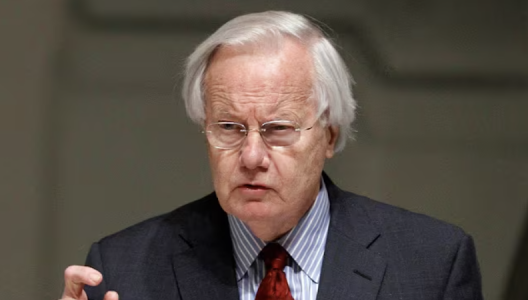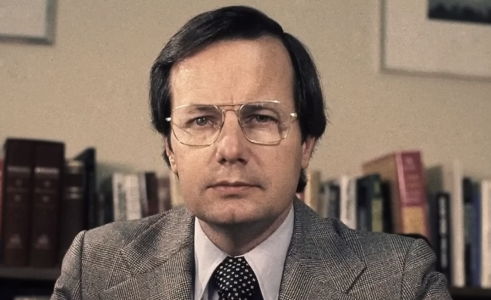Bill Moyers' lasting legacy: From the White House to PBS and beyond
By
Veronica E.
- Replies 0
In a media landscape often defined by noise, few voices ever resonated like that of Bill Moyers.
For generations of Americans, his calm, inquisitive presence offered clarity in times of uncertainty and depth in a world growing more distracted by the day.
From his early days in public service to his influential work in journalism, Moyers never stopped asking the hard questions—and listening for thoughtful answers.
He believed in conversation as a force for understanding and in journalism as a public good.
Now, at the age of 91, his passing offers a moment to reflect on a life that helped shape how we see power, culture, and ourselves.

Born Billy Don Moyers in Hugo, Oklahoma, in 1934, Moyers grew up in Marshall, Texas.
The son of a farmer and truck driver, he discovered his voice early—as a sportswriter for his school paper, since he was too small to play football.
This love of language and storytelling stayed with him through college at the University of Texas and later, seminary at Southwestern Baptist Theological Seminary.
Though briefly a Baptist minister, Moyers soon felt pulled in another direction.
A letter to then-Senator Lyndon B. Johnson led to a summer job—and ultimately, a front-row seat in American politics.
Moyers became a trusted aide to President Johnson and was with him on Air Force One the day John F. Kennedy was assassinated.
He went on to serve as Johnson’s White House press secretary during a turbulent time that included the Vietnam War.
Though initially a strong advocate for the administration, Moyers later expressed regret over some of his actions.
He spoke candidly about how the shift from a reform-minded presidency to a war-focused administration left him disillusioned.
In 1966, he resigned—an act that marked a turning point toward a more independent, introspective chapter of his career.
Moyers left politics behind, but not public service. As publisher of Newsday, he championed investigative journalism and helped the paper earn two Pulitzer Prizes.
But it was his work on public television where he became a familiar and trusted presence.
With Bill Moyers Journal and other PBS programs, he explored topics others often avoided: environmental concerns, government accountability, spirituality, mental health, and the American experience.
His interviews—with poet Maya Angelou, mythologist Joseph Campbell, and others—offered space for reflection, not confrontation.
In a world of fast takes and flashy headlines, Moyers believed in slowing things down.
“The question is, are the talking heads thinking minds and thinking people?” he once asked. “I think the most fascinating production value is the human face.”
His series The Power of Myth, in collaboration with Campbell, introduced millions to the timeless stories that shape cultures.
The Secret Government, a 1988 documentary, peeled back the layers of the Iran-Contra affair.
And his work on Healing and the Mind reshaped how many thought about mental and physical health.

Moyers was a passionate supporter of public broadcasting and independent media.
Through his production company, Public Affairs Television, he pushed back against the influence of corporate consolidation in journalism.
“You do not get rewarded for telling the hard truths about America in a profit-seeking environment,” he observed.
His career earned him widespread recognition: over 30 Emmy Awards, 11 Peabody Awards, three George Polk Awards, and induction into the Television Hall of Fame in 1995.
Moyers married Judith Davidson in 1954, and together they raised three children.
Judith was more than his life partner—she was also his creative collaborator and president of their production company.
Their shared commitment to thoughtful, people-centered media left a lasting mark.
In recent years, Moyers continued to produce new work, including the PBS series Now and a podcast focused on issues like voting rights, inequality, and American democracy.
His voice remained steady, compassionate, and curious to the end.
For many in The GrayVine community, Moyers’ legacy is deeply personal.
His work reminded us that journalism can be thoughtful, that conversation can be transformative, and that truth matters—especially when it’s inconvenient.
Whether you remember watching his interviews in real time or are just now discovering his body of work, his message remains relevant: keep asking, keep listening, and never stop caring.
Read next: Heartbreaking or twisted? The girl who fooled her grandma reveals the truth with grandma's last breath!

Did Bill Moyers influence how you see the world? Do you have a favorite interview or memory tied to one of his programs? We’d love to hear your reflections in the comments. His work always made room for public dialogue—let’s continue that tradition together.
For generations of Americans, his calm, inquisitive presence offered clarity in times of uncertainty and depth in a world growing more distracted by the day.
From his early days in public service to his influential work in journalism, Moyers never stopped asking the hard questions—and listening for thoughtful answers.
He believed in conversation as a force for understanding and in journalism as a public good.
Now, at the age of 91, his passing offers a moment to reflect on a life that helped shape how we see power, culture, and ourselves.

Bill Moyers spent decades bringing thoughtful, in-depth journalism to American audiences through public television and independent reporting. Image Source: YouTube / Eyewitness News ABC7NY.
From small-town roots to the national stage
Born Billy Don Moyers in Hugo, Oklahoma, in 1934, Moyers grew up in Marshall, Texas.
The son of a farmer and truck driver, he discovered his voice early—as a sportswriter for his school paper, since he was too small to play football.
This love of language and storytelling stayed with him through college at the University of Texas and later, seminary at Southwestern Baptist Theological Seminary.
Though briefly a Baptist minister, Moyers soon felt pulled in another direction.
A letter to then-Senator Lyndon B. Johnson led to a summer job—and ultimately, a front-row seat in American politics.
Also read: From airwaves to afterlife—Veteran radio DJ, a voice of generations, passes at 69
In the White House during pivotal moments
Moyers became a trusted aide to President Johnson and was with him on Air Force One the day John F. Kennedy was assassinated.
He went on to serve as Johnson’s White House press secretary during a turbulent time that included the Vietnam War.
Though initially a strong advocate for the administration, Moyers later expressed regret over some of his actions.
He spoke candidly about how the shift from a reform-minded presidency to a war-focused administration left him disillusioned.
In 1966, he resigned—an act that marked a turning point toward a more independent, introspective chapter of his career.
Also read: A surprise behind the wall: One home project revealed a long-buried secret—and someone was waiting too
Turning to journalism with integrity and purpose
Moyers left politics behind, but not public service. As publisher of Newsday, he championed investigative journalism and helped the paper earn two Pulitzer Prizes.
But it was his work on public television where he became a familiar and trusted presence.
With Bill Moyers Journal and other PBS programs, he explored topics others often avoided: environmental concerns, government accountability, spirituality, mental health, and the American experience.
His interviews—with poet Maya Angelou, mythologist Joseph Campbell, and others—offered space for reflection, not confrontation.
Also read: The death of a screen icon—how "Basic Instinct" star Denis Arndt left his mark on Hollywood before passing at 86
The art of conversation
In a world of fast takes and flashy headlines, Moyers believed in slowing things down.
“The question is, are the talking heads thinking minds and thinking people?” he once asked. “I think the most fascinating production value is the human face.”
His series The Power of Myth, in collaboration with Campbell, introduced millions to the timeless stories that shape cultures.
The Secret Government, a 1988 documentary, peeled back the layers of the Iran-Contra affair.
And his work on Healing and the Mind reshaped how many thought about mental and physical health.

A young Bill Moyers during his early years in public service, long before becoming one of public television’s most respected voices. Image Source: YouTube / PBS NewsHour.
Also read: The end of an era: James Bond’s notorious villain Bruce Glover passes away at 92—see his son's emotional farewell
A lifelong advocate for public discourse
Moyers was a passionate supporter of public broadcasting and independent media.
Through his production company, Public Affairs Television, he pushed back against the influence of corporate consolidation in journalism.
“You do not get rewarded for telling the hard truths about America in a profit-seeking environment,” he observed.
His career earned him widespread recognition: over 30 Emmy Awards, 11 Peabody Awards, three George Polk Awards, and induction into the Television Hall of Fame in 1995.
A shared mission with his family
Moyers married Judith Davidson in 1954, and together they raised three children.
Judith was more than his life partner—she was also his creative collaborator and president of their production company.
Their shared commitment to thoughtful, people-centered media left a lasting mark.
In recent years, Moyers continued to produce new work, including the PBS series Now and a podcast focused on issues like voting rights, inequality, and American democracy.
His voice remained steady, compassionate, and curious to the end.
For many in The GrayVine community, Moyers’ legacy is deeply personal.
His work reminded us that journalism can be thoughtful, that conversation can be transformative, and that truth matters—especially when it’s inconvenient.
Whether you remember watching his interviews in real time or are just now discovering his body of work, his message remains relevant: keep asking, keep listening, and never stop caring.
Read next: Heartbreaking or twisted? The girl who fooled her grandma reveals the truth with grandma's last breath!
Key Takeaways
- Bill Moyers, former White House press secretary and celebrated TV journalist, has died at the age of 91 after a long illness.
- Moyers was renowned for his thought-provoking PBS documentaries and interviews, tackling topics from government corruption and religion to environmental issues and media consolidation.
- Over his lengthy career, Moyers received more than 30 Emmys, 11 Peabody Awards and numerous other accolades, and was widely respected for his humanist and independent approach to journalism.
- Beginning as a Baptist minister and journalist in Texas, Moyers went on to a diverse career that included working for President Lyndon Johnson, publishing a Pulitzer-winning newspaper, and producing influential television series alongside his wife, Judith.
Did Bill Moyers influence how you see the world? Do you have a favorite interview or memory tied to one of his programs? We’d love to hear your reflections in the comments. His work always made room for public dialogue—let’s continue that tradition together.






